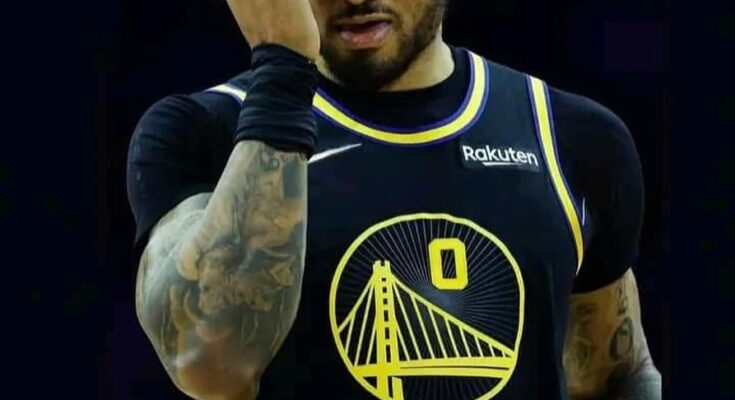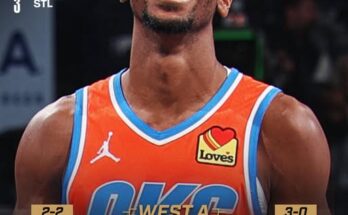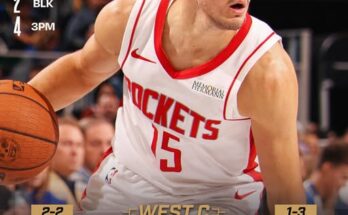**REPORT: The Golden State Warriors Are Open to Trading Gary Payton II for Suitable Offers, Per League Sources**
In a development that could reshape the Golden State Warriors’ approach to the upcoming season, multiple league sources have indicated that the organization is open to trading defensive specialist Gary Payton II, should a suitable offer present itself. While no deal is imminent, the openness marks a potential shift in the Warriors’ roster-building strategy as they look to retool their core around Stephen Curry in the twilight of his prime.
Payton, who rejoined the Warriors in 2023 after a brief stint with the Portland Trail Blazers, has been a fan favorite and locker-room presence, known for his elite on-ball defense, relentless energy, and high basketball IQ. However, his injury history, combined with Golden State’s shifting financial priorities and crowded rotation, has led the front office to consider all options.
The Warriors’ willingness to discuss Payton in trade talks is not a reflection of dissatisfaction with his performance, but rather a pragmatic acknowledgment of the team’s roster construction challenges, cap constraints, and long-term planning. General Manager Mike Dunleavy Jr. and the Warriors’ front office are exploring multiple pathways to return to title contention, and every asset, including valued role players like Payton, must be evaluated accordingly.
Golden State’s off-season has already been filled with intrigue and pivotal decisions. Klay Thompson’s departure to the Dallas Mavericks ended the long-standing “Splash Brothers” era. The re-signing of Draymond Green last summer and the development of young players like Jonathan Kuminga and Brandin Podziemski suggest a hybrid model of contention and youth movement. Still, after a disappointing 2024 campaign, the organization appears willing to take bold steps.
Gary Payton II, now 32, averaged modest numbers last season—4.3 points, 2.1 rebounds, and 1.1 steals per game—but stats do not fully capture his impact. His defensive presence, particularly against elite perimeter threats, provides immense value in high-leverage situations. Payton’s ability to guard multiple positions, disrupt passing lanes, and bring intensity off the bench makes him a unique chess piece. However, the Warriors already have a crowded backcourt with Curry, Chris Paul (if retained), Podziemski, and Moses Moody all needing minutes. The redundancy at the guard spot, especially with limited minutes available, may be a key reason why Payton could be on the move.
Moreover, the financial angle cannot be ignored. The Warriors are one of the league’s most expensive teams, having paid record-setting luxury taxes in recent years. New collective bargaining agreement (CBA) rules penalize repeat tax offenders with increased severity, making every dollar matter. Payton is owed approximately \$9 million for the 2025 season, which—when factoring in tax implications—could cost the Warriors significantly more. With Golden State trying to balance competitiveness and fiscal responsibility, moving Payton for a cheaper or more versatile asset could be part of that recalibration.
It’s worth noting that Payton was previously traded to the Warriors at the 2023 trade deadline in a deal that sent former No. 2 overall pick James Wiseman to Detroit. The acquisition was seen as a win-now move aimed at shoring up Golden State’s defense for the playoffs. However, Payton struggled with abdominal injuries that limited his availability and effectiveness during key stretches. While he has since returned to health, those concerns may still linger as the front office considers his long-term viability.
League executives believe Payton could be a valuable piece for several contending teams. His defensive intensity and championship pedigree are rare commodities, especially for teams lacking elite perimeter defense. The Milwaukee Bucks, Miami Heat, and Philadelphia 76ers are among the franchises reportedly monitoring his situation. The Bucks, in particular, have been linked to Payton due to their need for a reliable point-of-attack defender to complement Damian Lillard and Giannis Antetokounmpo. While there is no formal offer on the table, interest is expected to grow as training camp approaches and rosters begin to solidify.
From Golden State’s perspective, moving Payton would be about more than just cap relief. It would also create rotational clarity and potentially open a path for younger players like Moody to take on a more significant role. Moody has shown flashes of two-way capability, and the organization is invested in his development. If the Warriors are serious about integrating their younger core, it will require difficult choices—parting with veterans like Payton may be one of them.
There’s also the question of positional flexibility. While Payton excels defensively, his offensive game remains limited. He is not a reliable shooter from distance, and his offensive contributions come primarily in transition or as a cutter. In high-paced, switch-heavy offenses, that role can be valuable, but it can also be replaced more cost-effectively. The Warriors may be looking for a wing with more offensive upside or a stretch forward to complement their current roster.
Internally, the Warriors have not made any public declarations about trading Payton, and sources close to the player suggest he is content in the Bay Area. His bond with the coaching staff and familiarity with Steve Kerr’s system make him a comfortable fit. But comfort, as the NBA frequently reminds us, does not always translate to security.
As the league continues to evolve into a positionless, pace-and-space system, even high-level specialists like Payton must be evaluated through the lens of versatility and adaptability. The Warriors, ever the innovators, appear to be reassessing what kind of pieces best fit around their aging core. With Curry still performing at an elite level but approaching 37, maximizing his remaining championship window is paramount. That could mean sacrificing some defensive specialization in favor of offensive firepower or lineup flexibility.
Payton’s trade value lies in the eye of the beholder. For a contender seeking defense and hustle, he could be worth a late first-round pick or a high-upside young player. For rebuilding teams, his age and limited offensive game may be less appealing. The Warriors, knowing this, are unlikely to move him for pennies on the dollar. Any trade involving Payton would likely be part of a larger reconfiguration or done in concert with other moves to reshape the roster.
The timing of this potential trade talk is also significant. Training camps open in just under two months, and front offices across the league are finalizing their rosters. If Golden State intends to move Payton, the next six weeks represent the most likely window to strike a deal. Waiting longer could reduce leverage, especially if injuries or team needs shift elsewhere.
Ultimately, this development is emblematic of the Warriors’ transitional phase. No longer the dynastic juggernaut of 2015–2019, Golden State is now navigating the difficult terrain of maintaining competitiveness while building for the future. Every decision, from retaining free agents to exploring trades, is weighed against the dual goals of winning now and setting up for what comes next.
Gary Payton II has played an important role in the Warriors’ recent history, and his contributions to their 2022 championship run will not be forgotten. Whether he remains part of their future remains to be seen. But as the team reshapes its identity and reimagines its roster, even beloved role players like Payton are not immune from the business side of basketball.



